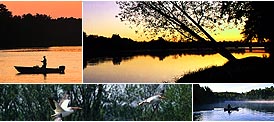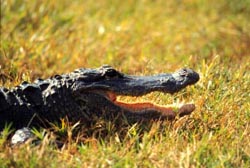

Alligator Hunting: A One of a Kind Experience -
Why They Call it Hunting Instead of Killing -
Florida's Other Crab - by Kris Thoemke
The Waiting Game - by Kris Thoemke
Mounted Memories - by Kris Thoemke
Eco-Touring in Collier County - by Kris Thoemke
Beyond the Largemouth Bass - by Kris Thoemke
Tying One On -- Some thoughts on how to get started tying your own flies -- by Kris Thoemke
The Big Cypress: Adventures in a Vast Wilderness
A Basic Guide to Saltwater Fly Fishing in Southwest Florida -- by Don Phillips
Four Strokes on the Water -- The sound of the future for marine outboards is likely to be much quieter --
Birding Big Cypress Swamp and the 10,000 Islands --
Recycling Your Fish -- by Kris Thoemke
Peace, Paddle and Hunt -- by Kris Thoemke
by Kris Thoemke
by Kris Thoemke
-- Kris Thoemke spends the day exploring the Big Cypress National Preserve with Preserve biologist Debra Jansen
by Kris Thoemke
by natural history writer and photographer Jeff Ripple
Alligator Hunting: A One of A Kind Experience
by Kris Thoemke
(4:30 a.m., the Saint Johns River) It happened so fast all I knew was that Glenn Wilson had a good sized gator in sight and didn't want this one to get away. The roar of the airboat motor increased, we sprinted ahead and Bob Cole stood up on the bow of the boat with the harpoon cocked in his arm, ready to throw. Sheri Taylor and I sat passively, intensely watching and waiting to see what would happen.
 As the boat passed by a dark blurry spot, Cole threw the harpoon. Glenn eased off on the power and swung the airboat around in a tight turn, all the time pivoting his head to keep an eye on the float attached to the harpoon line.
As the boat passed by a dark blurry spot, Cole threw the harpoon. Glenn eased off on the power and swung the airboat around in a tight turn, all the time pivoting his head to keep an eye on the float attached to the harpoon line.
For a few seconds, no one was sure if Bob hit or missed the animal. Standing by the controls of his airboat Glenn yelled in an ascending voice, "Did you get him, did you get him?” Suddenly the line attached to the harpoon went taunt and the large float attached to it raced off into the dark. “Yea, you got 'em! All right!"
Twenty minutes later, after tracking the float to it’s final resting place, Glen and Bob had the ten-foot long gator at side of the boat. Making a dangerous situation look easy, Glenn killed the unpredictable reptile with a bang stick. Death came instantly but he waited a few minutes before reaching in the water to pull the animal onto the deck of the airboat. As soon as the gator was out of the water, Bob wrapped the mouth with several winds of tape while Glenn placed a tag in the animal’s tail.
Did you see how that float took off across the water,” Glenn asked. "It was like Jaws. When you see a buoy running like that you know it's a big gator." No kidding.
Alligator hunting is unlike any other type of hunting you've ever heard of or experienced. For starters, it is the only type of hunt where the hunter does not have to lift a finger if he or she does not want to. This night, neither Wilson or Cole was the licensed hunter. Sheri Taylor, who sat next to Glenn most of the evening, was the hunter and Wilson and Cole were her agents.
This unique arrangement is part of the complex rules by which the Game and Fresh Water Fish Commission operates the annual alligator hunt. The method of first catching and then killing the ten footer and the three smaller gators Taylor took that night are also part of the rules.
Considered legal game until 1963, gator hunting was a profitable, but poorly managed venture. With the animal on the verge of extinction, the state banned hunting and designated the reptile a protected species. In 1988, with the number of gators near record levels in some parts of the state, the Commission decided to establish a tightly controlled harvesting program.
The interest in hunting alligators is stunning. Anyone can enter the drawing to win one of the annual hunting permits. In 1995, 8,909 people submitted applications for one of the 573 permits awarded in a random draw. Winners must pay a $250 fee for the license if they are residents and $1,000 if they are non-residents.
Many winners are inexperienced when it comes to gator hunting. While the Commission strongly encourages all winners attend a three-hour training session, it is not mandatory. But, talking about hunting alligators and actually doing it are two different subjects. The hands on experience requires skills and equipment most licensed hunters don't have. That's where people like Glenn Wilson can help.
Wilson operates Gator Ventures from his fish camp and restaurant on Lake Jessup, one of a series of lakes that connects to the St. Johns River in central Florida near Sanford. Using his custom built, $65,000 airboat, the Florida native spends most to the year taking visitors around the sparsely developed lake to show them a piece of natural Florida. Seeing alligators is always at the top of the visitors to do list and Lake Jessup is a haven for the animals. After spending hundreds of hours on the water, he knows where the big gators live, how to get close to them, and when is the best time to find them.
Taylor, a friend of Wilson's used him and Cole as her agents. Under this arrangement, they could legally do the hunting for her so long as she was present.
For close to seven hours we darted and zigzagged across the waters of the St. Johns River and surrounding marshes. It was as if the airboat was an extension of Wilson's body. With a bright spotlight strapped to his head, he constantly scanned the waters ahead looking for the mirror-like reddish glow of a gator's eyes reflecting in the light. Seeing a possibility, he maneuvered the boat into position as easily as you put a fork in your mouth.
Hunters can harvest the meat, have the valuable skin parts tanned and keep the products for personal use or sell them. They can also follow Wilson's suggestion and sell their animals to a processor. The one he uses buys the entire animal for $35/foot for gators less than 13 feet and $45/foot for ones over that. By my rough calculations, the four gators that Taylor's sold to the processor netted $1050.
If you have a real desire to watch a hunt, Wilson take a few "thrill seekers," as he calls them, along as observers. He charges $100-150 dollars for the experience and says there are plenty of takers. "All I have to do is put a sign up in my restaurant and people will book them like that," he said as he snapped his fingers. Potential thrill seekers can call Wilson to see if there are any openings. His number is 407 365-1244.












